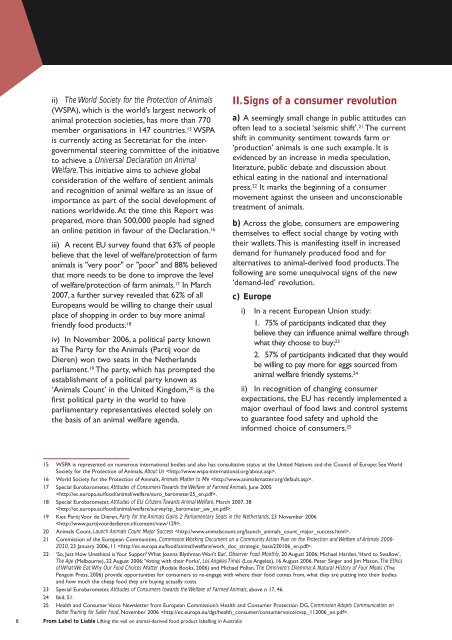From Label to Liable: Scams, Scandals and Secrecy - Voiceless
From Label to Liable: Scams, Scandals and Secrecy - Voiceless
From Label to Liable: Scams, Scandals and Secrecy - Voiceless
You also want an ePaper? Increase the reach of your titles
YUMPU automatically turns print PDFs into web optimized ePapers that Google loves.
ii) The World Society for the Protection of Animals<br />
(WSPA), which is the world’s largest network of<br />
animal protection societies, has more than 770<br />
member organisations in 147 countries. 15 WSPA<br />
is currently acting as Secretariat for the intergovernmental<br />
steering committee of the initiative<br />
<strong>to</strong> achieve a Universal Declaration on Animal<br />
Welfare. This initiative aims <strong>to</strong> achieve global<br />
consideration of the welfare of sentient animals<br />
<strong>and</strong> recognition of animal welfare as an issue of<br />
importance as part of the social development of<br />
nations worldwide. At the time this Report was<br />
prepared, more than 500,000 people had signed<br />
an online petition in favour of the Declaration. 16<br />
iii) A recent EU survey found that 63% of people<br />
believe that the level of welfare/protection of farm<br />
animals is "very poor" or "poor" <strong>and</strong> 88% believed<br />
that more needs <strong>to</strong> be done <strong>to</strong> improve the level<br />
of welfare/protection of farm animals. 17 In March<br />
2007, a further survey revealed that 62% of all<br />
Europeans would be willing <strong>to</strong> change their usual<br />
place of shopping in order <strong>to</strong> buy more animal<br />
friendly food products. 18<br />
iv) In November 2006, a political party known<br />
as The Party for the Animals (Partij voor de<br />
Dieren) won two seats in the Netherl<strong>and</strong>s<br />
parliament. 19 The party, which has prompted the<br />
establishment of a political party known as<br />
‘Animals Count’ in the United Kingdom, 20 is the<br />
first political party in the world <strong>to</strong> have<br />
parliamentary representatives elected solely on<br />
the basis of an animal welfare agenda.<br />
II.Signs of a consumer revolution<br />
a) A seemingly small change in public attitudes can<br />
often lead <strong>to</strong> a societal ‘seismic shift’. 21 The current<br />
shift in community sentiment <strong>to</strong>wards farm or<br />
‘production’ animals is one such example. It is<br />
evidenced by an increase in media speculation,<br />
literature, public debate <strong>and</strong> discussion about<br />
ethical eating in the national <strong>and</strong> international<br />
press. 22 It marks the beginning of a consumer<br />
movement against the unseen <strong>and</strong> unconscionable<br />
treatment of animals.<br />
b) Across the globe, consumers are empowering<br />
themselves <strong>to</strong> effect social change by voting with<br />
their wallets. This is manifesting itself in increased<br />
dem<strong>and</strong> for humanely produced food <strong>and</strong> for<br />
alternatives <strong>to</strong> animal-derived food products. The<br />
following are some unequivocal signs of the new<br />
‘dem<strong>and</strong>-led’ revolution.<br />
c) Europe<br />
i) In a recent European Union study:<br />
1. 75% of participants indicated that they<br />
believe they can influence animal welfare through<br />
what they choose <strong>to</strong> buy; 23<br />
2. 57% of participants indicated that they would<br />
be willing <strong>to</strong> pay more for eggs sourced from<br />
animal welfare friendly systems. 24<br />
ii) In recognition of changing consumer<br />
expectations, the EU has recently implemented a<br />
major overhaul of food laws <strong>and</strong> control systems<br />
<strong>to</strong> guarantee food safety <strong>and</strong> uphold the<br />
informed choice of consumers. 25<br />
8<br />
15 WSPA is represented on numerous international bodies <strong>and</strong> also has consultative status at the United Nations <strong>and</strong> the Council of Europe: See World<br />
Society for the Protection of Animals, About Us .<br />
16 World Society for the Protection of Animals, Animals Matter <strong>to</strong> Me .<br />
17 Special Eurobarometer, Attitudes of Consumers Towards the Welfare of Farmed Animals, June 2005<br />
.<br />
18 Special Eurobarometer, Attitudes of EU Citizens Towards Animal Welfare, March 2007, 38<br />
.<br />
19 Kies Partij Voor de Dieren, Party for the Animals Gains 2 Parliamentary Seats in the Netherl<strong>and</strong>s, 23 November 2006<br />
.<br />
20 Animals Count, Launch Animals Count Major Success .<br />
21 Commission of the European Communities, Commission Working Document on a Community Action Plan on the Protection <strong>and</strong> Welfare of Animals 2006-<br />
2010, 23 January 2006, 11 .<br />
22 ‘So, Just How Unethical is Your Supper What Joanna Blythman Won't Eat’, Observer Food Monthly, 20 August 2006; Michael Harden, ‘Hard <strong>to</strong> Swallow’,<br />
The Age (Melbourne), 22 August 2006; ‘Voting with their Forks’, Los Angeles Times (Los Angeles), 16 August 2006. Peter Singer <strong>and</strong> Jim Mason, The Ethics<br />
of What We Eat: Why Our Food Choices Matter (Rodale Books, 2006) <strong>and</strong> Michael Pollan, The Omnivore's Dilemma: A Natural His<strong>to</strong>ry of Four Meals (The<br />
Penguin Press, 2006) provide opportunities for consumers <strong>to</strong> re-engage with where their food comes from, what they are putting in<strong>to</strong> their bodies<br />
<strong>and</strong> how much the cheap food they are buying actually costs.<br />
23 Special Eurobarometer, Attitudes of Consumers <strong>to</strong>wards the Welfare of Farmed Animals, above n 17, 46.<br />
24 Ibid, 51.<br />
25 Health <strong>and</strong> Consumer Voice Newsletter from European Commission’s Health <strong>and</strong> Consumer Protection DG, Commission Adopts Communication on<br />
Better Training for Safer Food, November 2006 .<br />
<strong>From</strong> <strong>Label</strong> <strong>to</strong> <strong>Liable</strong> Lifting the veil on animal-derived food product labelling in Australia


